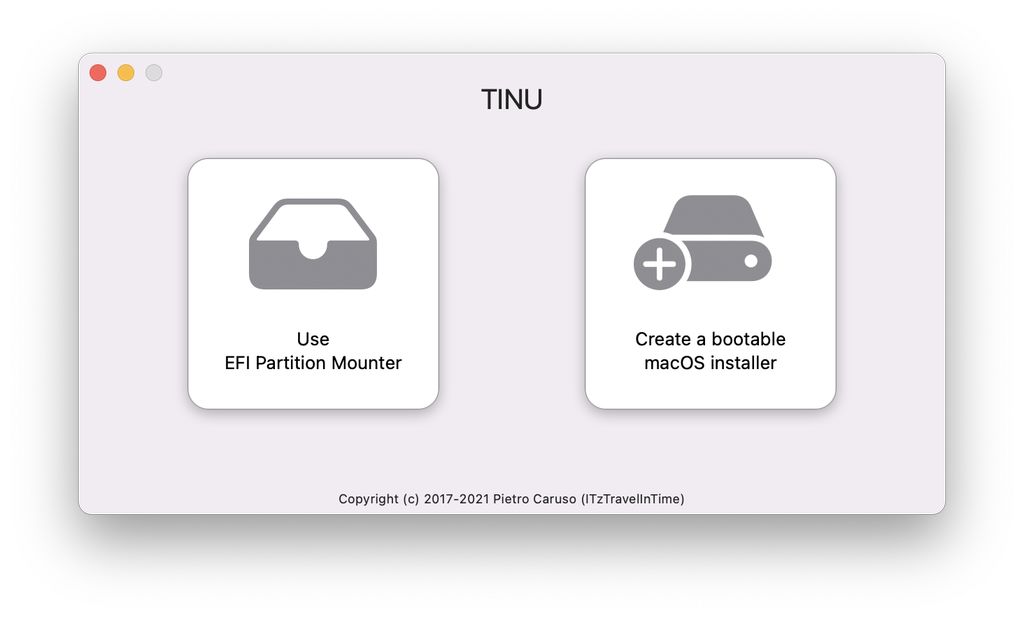TINU 3.0 erschienen: Erzeugt macOS-USB-Installer

Der kleine Hinweis an die Bastel-Fraktion, die gerne Werkzeuge bezüglich macOS im Hinterkopf hat: TINU 3.0 ist veröffentlicht worden. Noch nie davon gehört? Dann seid ins Boot geholt. TINU erlaubt das Erstellen von bootfähigen Mac-Installationsmedien. TINU ist unter anderem auch eine grafische Benutzeroberfläche für die ausführbare Datei createinstallmedia, die in jeder macOS-Installationsanwendung von Mavericks bis zu den neuesten Versionen zu finden ist. Version 3.0 von TINU bringt einen neuen Algorithmus für die Erkennung von nutzbaren Laufwerken und Partitionen, unbrauchbare/ nicht unterstützte Laufwerke und Partitionen werden nun angezeigt und als unbrauchbar/nicht unterstützt gekennzeichnet, anstatt versteckt zu werden (gilt noch nicht für APFS-Volumes). Ferner wurde das Ganze nun auch für macOS Monterey angepasst. Das Ganze ist Open Source und lässt sich hier herunterladen.
Transparenz: In diesem Artikel sind Partnerlinks enthalten. Durch einen Klick darauf gelangt ihr direkt zum Anbieter. Solltet ihr euch dort für einen Kauf entscheiden, erhalten wir eine kleine Provision. Für euch ändert sich am Preis nichts. Partnerlinks haben keinerlei Einfluss auf unsere Berichterstattung.



Danke für den Tipp!!!
Leider nicht via HomeBrew installierbar. Schön wäre natürlich der integrierte Download des Installationspaketes …
Alternativ gibt es noch den DiskMaker X.
Inklusive Downloadlink zum jeweiligen MacOS-Installationspaket.
https://diskmakerx.com/
Der Diskmaker ist bei Version Catalina stehen geblieben und wird nicht scheinbar mehr mehr aktualisiert.
Vielen Dank für die Info!
Das habe ich glatt übersehen.
Eine ernst gemeinte Frage: „Wofür braucht man das?“
Die neueren Macs supporten das installieren von einem USB-Stick aus Sicherheitsgründen nicht mehr (so meine ich).
Außerdem kann man mit [cmd]+[option]+[R] den macOS-Installer auf jedem Mac aus dem Internet starten.
Allerdings kommt dazu, dass manche macOS Updates auch das UEFI updaten – in der Regel vor allem bei einem Versions-Sprung. Das bedeutet, dass es dadurch nur durch den Update-Vorgang (innerhalb einer funktionierenden Installation) möglich ist, das UEFI zu updaten. Erst anschließend kann man die dazu passende Version auch mit dem oben genannten Installer auch wieder frisch installieren.
Wird auch gerne bei Hackintosh genommen – also speziell dieses Tool.
re: sebo habe noch keine neuinstallation von big sur gebraucht aber gestern konnte ich noch einwandfrei von einem usb stick in big sur auf einem m1 macbook booten und den installer öffnen.
danke für den tipp caschy!
hab gestern boot sticks gebastelt und mußte festellen das nach diskmakerX jetzt auch install disk creator den geist aufgegeben hat, zumindest unter big sur 11.6.1. unter catalina kein problem.
möglich das meine big sur installation da einen hau hat aber am terminal des m1 macs wollte es auch nicht klappen.
die auf dem intel mac unter catalina erzeugten sticks funktionieren einwandfrei.
Hi, thank you for posting about my app, happy to see it getting some attention from the greater commiunity.
I put a lot of work and passion into the app and i am happy that people are using it.
As another thank you I want also to give you a little inside about a new feature that i am working on for the next releases of TINU, it is Mountain lion installer creation support, it uses the macOS’s asr command line utility and not createinstallmedia executable (since therisn’t any createinstallmedia available inside the Mountain Lion Installer app and that it also contains a bootable os installer image with all the installer packages inside and ready to boot). Initial testing of this new feature are very promissing, but it needs some more debug and validation, but for now it’s very likely this new feature will make it to the next stable release. The OS X Lion installer on the other hand, is very similar and in theory it could be made into an installer drive using the same method as the mountain lion one, but in practice, at least for now, my attempts at using it, with the installer app copyes i have managed to source, are not very promissing (because of some wired checksum error at the end of the asr restore process that i haven’t figured out yet), and so i need to perform more investigation, and therefor i can’t guaratee that OS X Lion installer creation support will make it to release.
To reply to one of the comments: About apple silicon macs i think an macOS installer on a usb drive can be very usefoul in a lot of situations because it allows you to install any os version compatible with your mac and to install them in a wide variaty of situations, including, for example, while being offile or with a mac having some problems (like trouble getting connected to the internet recovery), and as far as i know it’s possible to boot from external devices on those newer macs, but reguardless the tool has always been focues on intel machines because that’s what i own and use everyday, but i’d like to do my own tests with the new macs and fix the app if needed. I have also been in similar sutuations to what i mentioned, a lot, and that’s what’s inspired to me to make the app in the first place, so more people can make and use installers (Also as an alternatives to closed source tools that messes with the installer files in unkown ways, that’s also why my app is free and open source).
Again, thank you for making an article about the app, and reading trought the comment, whish all of you the best of luck.
Greetings from the creator of TINU.
PS: If you want to contact me you can find my contacts inside the TINU’s README file on the github repository.